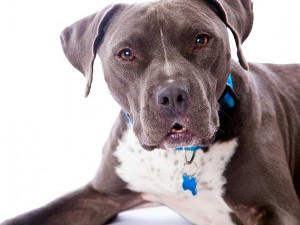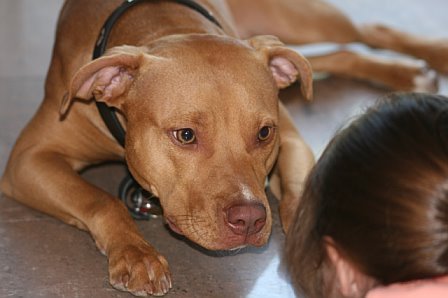Have you ever heard the myth that pitbull jaws can lock? Well, here’s a surprising fact for you: pitbull jaws do not actually lock! Contrary to popular belief, pitbulls do not have a locking mechanism in their jaws, making this claim nothing more than a myth.
Now, let’s dive into the truth behind this misconception. Pitbulls, like any other breed of dog, have a normal anatomical structure in their jaws. They have strong muscles and sharp teeth, but their jaws do not possess any special mechanism that allows them to lock. In fact, the idea of their jaws locking likely stemmed from their determination and tenacity in holding onto things. Despite their strong bite force, it is important to remember that pitbulls are loyal and loving animals, and it is erroneous to label them as inherently dangerous based on misconceptions about their jaws.

Do Pitbull Jaws Really Lock? Separating Fact from Fiction
Pitbulls are a popular breed of dog known for their strength, loyalty, and unfortunately, a few misconceptions. One of the most common myths surrounding pitbulls is that their jaws have the ability to “lock” or exert an unbreakable grip. In this article, we will explore the truth behind this claim and debunk the misconceptions. By understanding the anatomy and behavior of pitbulls, we can dispel the myths and gain a better understanding of these wonderful dogs.
The Anatomy of a Pitbull’s Jaw
Pitbulls are strong and muscular dogs, known for their powerful bite force. However, it is important to note that the structure of their jaws is no different from other breeds of dogs. The jaws of pitbulls, like all canines, are composed of bone, muscles, tendons, and ligaments. There is no specific mechanism that allows their jaws to “lock” in place.
Their bite strength, on the other hand, is impressive. According to studies, pitbulls have one of the highest bite forces among the domestic dog breeds. Their bite force can range from 235 to 250 pounds per square inch (psi). To put this into perspective, the average human bite force is around 162 psi. It is this strong bite force that often leads to misconceptions about the locking of their jaws.
Debunking the Myth: The Truth about Pitbull Jaws
Contrary to popular belief, pitbulls do not have a special mechanism that allows their jaws to lock. Their jaws are not anatomically different from other breeds of dogs. What makes pitbulls seem determined and difficult to release their bite is their tenacity and determination, traits that are found in many dog breeds. When a pitbull bites down, their strong muscles and bite force can make it challenging to separate them from their grip, but there is no physical lock involved.
It is important to understand that any breed of dog has the potential to bite and hold on if they feel threatened or provoked. The perception of pitbulls having a “locking” mechanism may stem from their history in dogfighting, where they were selectively bred for their strong bite and fighting abilities. However, it is crucial to remember that a dog’s behavior is a result of its training, upbringing, and environment. Treating pitbulls with love, care, and positive training methods can help shape them into gentle and loving companions.
The Importance of Responsible Ownership and Education
The misconceptions surrounding pitbulls and their jaws highlight the need for responsible ownership and education. It is important for potential owners and the general public to have accurate information about these dogs. Pitbulls, like all breeds, are individuals with unique personalities and characteristics. Their behavior is influenced by their genetics, upbringing, and training.
Responsible ownership includes socializing pitbulls from a young age, providing proper training, and ensuring they receive regular exercise and mental stimulation. Educating oneself and others about dog behavior, body language, and responsible ownership practices are essential to prevent misconceptions and promote a positive image of pitbulls and other breeds.
Understanding the True Nature of Pitbulls
Pitbulls are often misunderstood and subjected to unfair stereotypes. By dispelling myths such as the notion of their jaws “locking,” we can better understand and appreciate these dogs for who they really are. Pitbulls are loyal, intelligent, and loving companions when bred and raised responsibly.
Training Tips for Pitbull Owners
1. Socialize your pitbull from an early age: Introduce them to various people, animals, and environments to build their confidence and ensure they are comfortable in different situations.
2. Use positive reinforcement techniques: Reward good behavior with treats, praise, and affection. Avoid punishment-based training methods, as they can lead to fear and aggression.
3. Provide regular exercise: Pitbulls are energetic dogs that require daily exercise to stay happy and healthy. Engage in activities such as walks, playtime, and mental stimulation games.
4. Enroll in obedience classes: Professional training classes can provide guidance and help teach your pitbull basic commands and good manners.
Common Misconceptions about Pitbulls
-
Pitbulls are inherently aggressive:
Pitbulls, like all breeds, can exhibit aggression if mistreated or poorly trained. Proper socialization, training, and responsible ownership can help prevent aggressive behavior.
-
Pitbulls have a locking jaw mechanism:
This is a myth; pitbulls do not have a special jaw structure that allows them to lock their jaws.
-
Pitbulls are dangerous around children:
When raised and socialized properly, pitbulls can be gentle and loving family pets. However, it’s always important to supervise interactions between dogs and children.
-
Pitbulls are more prone to aggression than other breeds:
Aggression is not a breed-specific trait. It is influenced by a dog’s genetics, upbringing, and training. All breeds have the potential to be aggressive if mistreated.
Responsible Pitbull Ownership: Myths vs. Reality
Myth: Pitbulls are inherently aggressive and dangerous.
Reality: The behavior of pitbulls, like any other dog breed, is influenced by factors such as training, socialization, and upbringing. Responsible ownership and positive training methods can shape them into well-behaved and loving companions.
Myth: Pitbulls have a locking mechanism in their jaws.
Reality: Pitbulls do not possess a special jaw structure that allows them to lock their jaws. Their bite force and tenacity can make it challenging to separate them from a grip, but it is not due to a physical lock.
Myth: Pitbulls are dangerous around children.
Reality: With proper socialization, training, and supervision, pitbulls can be gentle and loving family pets. As with any dog, it’s important to ensure safe interactions between dogs and children.
Myth: Pitbulls are more prone to aggression than other breeds.
Reality: Aggression is not limited to any specific breed. It is influenced by various factors such as genetics, upbringing, and training. All breeds have the potential for aggression if mistreated or poorly trained.
By dispelling these myths and misconceptions, we can promote a better understanding and appreciation for pitbulls and work towards responsible ownership practices that benefit both the dogs and their human companions.
Key Takeaways: Do Pitbull Jaws Really Lock?
- Pitbull jaws do not have a locking mechanism like some people believe.
- Pitbulls have strong jaw muscles, but they do not physically lock their jaws.
- Despite their strong bite force, pitbulls can be trained to have gentle and loving behaviors.
- Individual pitbull behavior can vary, and aggression is not solely dependent on their jaws.
- Proper socialization and responsible ownership play a significant role in a pitbull’s behavior.
Frequently Asked Questions
Curious about pitbull jaws? We’ve got answers to some common questions you may have!
How strong is a pitbull’s bite?
A pitbull’s bite is indeed powerful, but contrary to popular belief, their jaws do not “lock.” Pitbulls have strong jaw muscles and a determined bite force, which can be around 235-250 pounds per square inch (psi). This is comparable to other breeds like the German Shepherd or Rottweiler. The idea of their jaws locking is a myth.
While their bite can cause damage, it’s important to note that any dog breed can bite and cause injury when improperly trained, provoked, or in certain situations. Responsible ownership, proper socialization, and positive training methods are key to having a well-behaved and safe pitbull or any other breed.
Are pitbulls more dangerous than other dog breeds?
No, pitbulls are not inherently more dangerous than other dog breeds. It’s essential to remember that a dog’s behavior is influenced by various factors such as genetics, socialization, training, and environment. Stereotyping an entire breed based on isolated incidents can be unfair and misleading.
Pitbulls, like any other breed, can be loving, loyal, and gentle when properly cared for and raised. Responsible pet ownership, positive reinforcement training, and early socialization play a crucial role in shaping a dog’s behavior. It’s important not to generalize or judge a breed solely based on media portrayals or stereotypes.
Do pitbulls have a stronger bite compared to other dog breeds?
While pitbulls have strong jaws and a powerful bite, they do not have the strongest bite force among dog breeds. The bite force of a dog depends on various factors, including the size of its skull, jaw muscles, and tooth structure.
According to scientific studies, breeds like the Rottweiler, German Shepherd, and Kangal have higher bite forces compared to pitbulls. However, it’s important to note that bite force doesn’t determine a dog’s temperament or overall behavior. Temperament is influenced by a combination of genetics, training, socialization, and individual personality.
Why do pitbulls have a reputation for aggressive behavior?
Pitbulls have unfortunately gained a reputation for aggressive behavior due to media sensationalism and negative stereotypes. Often, instances of aggression involving pitbulls are overrepresented or exaggerated, leading to misconceptions about the breed.
Like any other breed, a pitbull’s behavior is shaped by factors such as genetics, upbringing, socialization, and training. Responsible ownership, early socialization, and positive reinforcement training methods are all crucial in raising a well-behaved and balanced pitbull. It’s important to judge dogs on an individual basis rather than making assumptions based on their breed.
Are pitbulls suitable for families with children?
Yes, pitbulls can be suitable for families with children. Pitbulls, when raised in a loving, well-socialized environment, can be affectionate, gentle, and protective of their human family members, including children.
However, it’s important to note that like any other dog, supervision and teaching children how to properly interact with dogs are key. Children should be taught to respect a dog’s space, ask for permission before approaching, and not engage in rough play or tail-pulling. Responsible pet ownership and proper training are crucial for creating a safe and harmonious environment for both dogs and children.

Summary
So, do pitbull jaws really lock? The answer is no! Contrary to the popular myth, pitbulls do not have locking jaws. Their jaws are just like any other breed of dog. While they do have strong jaws, they do not have the ability to lock them in place.
Pitbulls have been unfairly portrayed as dangerous and aggressive due to this misconception. It’s important to remember that a dog’s behavior is influenced by its upbringing and environment, not the structure of its jaws. Like any other breed, pitbulls can be loving and loyal companions with proper training and care.
